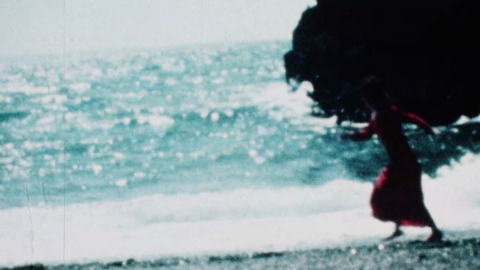This film is currently unavailable

Red Sea
Spring tides and menstrual cycles at the full and new moon
Overview
Spring tides at Ynys Llanddwyn at the full and new moon are compared to the filmmaker’s own ‘body tides’ from dark to light and back again. Like other films by Judith Noble (formerly Higginbottom), The Red Sea is concerned with the menstrual cycle, and its relationship to lunar cycle. Higginbottom and other feminist artists such as Catherine Elwes, Carolee Schneemann and Judy Clark were trying to reclaim menstruation from its negative image and assert it as a source of creative energy. The Red Sea is made of 16mm film and 35mm still images, re-worked and over-printed.
Founded in 1966, the London Film-Makers’ Co-operative started life at Better Books, a counter-culture bookshop on Charing Cross Road, where a group led by poet Bob Cobbing and filmmakers Stephen Dwoskin and Jeff Keen met to screen films. Initially inspired by the activities of the New American Cinema Group in New York, the London Co-op grew into a pioneering organisation that incorporated a film workshop, cinema space and distribution office. During its four-decade history, the Co-op played a crucial role in establishing film as an art form in the UK and participated in a vibrant international film scene. This BFI Player collection brings together new scans of films distributed by and/or produced at the London Co-op. Although produced at the London Film-Makers’ Co-operative, Higginbottom was also a member of Circles – the first women artists' film and video distribution organisation in Britain. Circles was founded in 1979 by a group of filmmakers including Lis Rhodes, Jo Davis, Felicity Sparrow and Annabel Nicolson, many of whom had worked at the Co-op. Their work continues today through Cinenova, formed in 1991 from the merger of Circles and another feminist distributor, Cinema of Women.
Related

Focii Focii
Animation & Artists Moving Image 1975 9 mins Silent
A female dancer performs in front of what appears to be a wall of mirrors until her reflection takes on a life of its own.

Guerillere Talks Guerillere Talks
Animation & Artists Moving Image 1978 24 mins
Six film portraits of women associated with the punk music scene in 1970s New York.

Tea Leaf Tea Leaf
Documentary 1988 8 mins
An intimate account of frustration and disarray in 1980s Britain from the point of view of a young woman.

Spot the Microdot Spot the Microdot
Animation & Artists Moving Image 1969 8 mins
An unprintable film, handmade by punching holes into an opaque 16mm strip.

Emily (Third Party Speculation) Emily (Third Party Speculation)
Animation & Artists Moving Image 1979 62 mins
Filmed in a closed domestic environment, this film investigates the question of identification and point of view in cinema.

Blind White Duration Blind White Duration
Animation & Artists Moving Image 1968 13 mins Silent
Interaction between a blank white screen and filmed snow.

Layla - Exclusive Q&A Layla - Exclusive Q&A
Short interview 2025 27 mins
Writer, director and performer Amrou Al-Kadhi talks to Rico Johnson-Sinclair about their debut feature.

All We Imagine As Light - Exclusive Q&A All We Imagine As Light - Exclusive Q&A
Short interview 2025 28 mins
Payal Kapadia discusses her Cannes prize-winning and Bafta-nominated drama with Ashanti Omkar.

Khichdi Khichdi
Animation & Artists Moving Image 2023 16 mins
The interwoven stories of four best friends who reunite in the UK, thirty-five years after training together as nurses during their teens in Ferozepur, Punjab.

Dr XYZ: A Medical Drag Transthology Dr XYZ: A Medical Drag Transthology
Documentary 2023 15 mins
A satirical take on the healthcare service announcements of the 1960s and 70s.

Every Moment Counts Every Moment Counts
Animation & Artists Moving Image 2023 9 mins
A short animation that offers a window into the world of children’s palliative care.

Police Story: Panel Discussion Police Story: Panel Discussion
Inside Film 2024 24 mins
Panel discussion on Jackie Chan's 1985 action classic Police Story, with Chase Armitage, Sam Mak and Jadey Duffield.